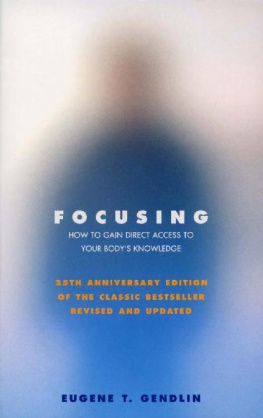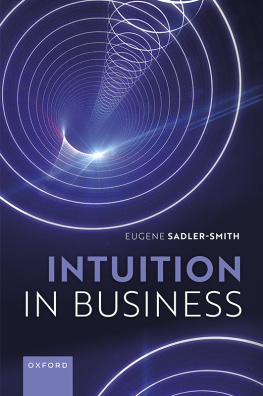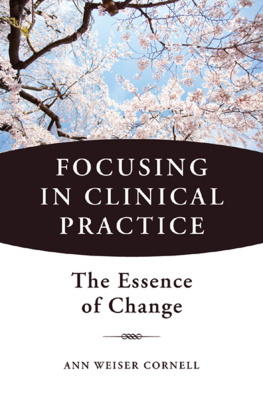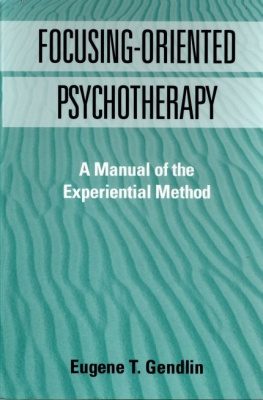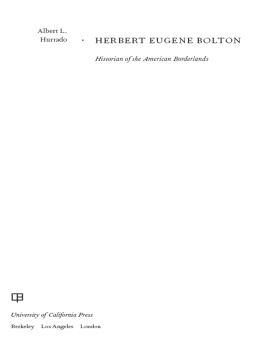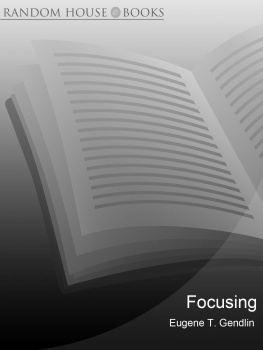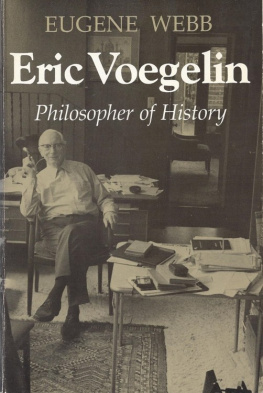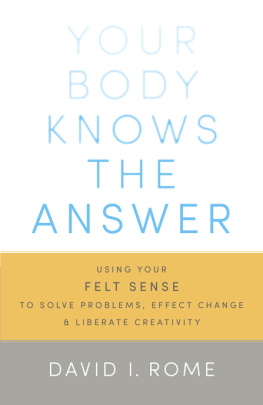ABOUT THE AUTHOR
Eugene T. Gendlin, Ph.D., University of Chicago, has been honoured three times by the American Psychological Association for his development of experimental psychotherapy. He received the first Distinguished Professional Psychologist of the Year award from the Clinical Division and an award from the Philosophical Psychology Division; he and the Focusing Institute received an award from the Humanistic Division in 2000. He was the founder and editor for many years of the Clinical Division journal Psychotherapy: Theory, Research and Practice. His book Focusing has sold over 400,000 copies and is translated into twelve languages. His other books include Let Your Body Interpret Your Dreams, Focusing-Oriented Psychotherapy, Experiencing and the Creation of Meaning, Language Beyond Post-Modernism: Saying and Thinking in Gendlins Philosophy (edited by David Levin). He has published many articles. He is internationally recognized as a major American philosopher and psychologist. A complete bibliography is available at www.focusing.org.
APPENDIX
a. Philosophical Note
b. Research, Applications and References
c. Directory: Where to Get More Training in Focusing or Psychotherapy That Employs It
d. Focusing: Short Form
one
The Inner Act
At the University of Chicago and elsewhere in the past fifteen years, a group of colleagues and I have been studying some questions that most psychotherapists dont like to ask out loud. Why doesnt therapy succeed more often? Why does it so often fail to make a real difference in peoples lives? In the rarer cases when it does succeed, what is it that those patients and therapists do? What is it that the majority fail to do?
Seeking answers, we studied many forms of therapy from classical approaches to recent ones. We analyzed literally thousands of therapistpatient sessions recorded on tape. Our series of studies has led to several findings, some very different from what we and most other professional therapists expected.
First, we found that the successful patientthe one who shows real and tangible change on psychological tests and in lifecan be picked out fairly easily from recorded therapy sessions. What these rare patients do in their therapy hours is different from the others. The difference is so easy to spot that, once we had defined it, we were able to explain it to inexperienced young undergraduates, and they too were able to sort out the successful patients from the others.
What is this crucial difference? We found that it is not the therapists techniquedifferences in methods of therapy seem to mean surprisingly little. Nor does the difference lie in what the patients talk about. The difference is in how they talk. And that is only an outward sign of the real difference: what the successful patients do inside themselves.
The purpose of this book is to tell you what they do and how you can do it. For this uncommon skill, this internal act, not only is useful in a psychotherapists office, it is a way of approaching any problem or situation.
We have taught this skill to large numbers of people not in therapy in subsequent years. Now that it seems anyone can learn it, I also want this book to be readable by anyone. The book is addressed to professionals, but not only to them. Therefore I am writing it simply and not in the technical manner of my philosophical and scientific publications.
The skill we have observed and defined is not only for problems. Among those who know it, it becomes an internal source that is consulted many times every day. I am using it right now, in the process of writing this book.
The skill I am about to teach you is called focusing.
It will enable you to find and change where your life is stuck, cramped, hemmed in, slowed down. And it will enable you to changeto live from a deeper place than just your thoughts and feelings.
One fact that disturbed us the most in those research studies was that patients who did the crucial thing inside themselves could be picked out in the first two therapy sessions. We found we could predict success or failure right from the start just by analyzing the early interviews. According to a careful statistical analysis, there was less than a thousand-to-one chance of getting the same finding accidentally.
Today we know how to teach focusing. So this finding does not mean that some people cannot learn it. But at the time this was a shocking discovery. Here we had therapists and patients embarking on a year or more of hard effort. Much human need, hope, devotion, and money would be involved, and we already knew they would fail.
The finding means that psychotherapy as usually practiced doesnt show patients how to do psychotherapy. In other words, patients did not improve with practice. If they did not somehow know right from the start how to approach themselves inside in that special way, they did not achieve major changes, no matter what they or their therapists did or how earnestly or for how long.
This finding was contrary to my predictions, and to what had been my own firm subjective conviction. I thought I had experienced the gradual opening and increasing ability of patients to come into touch with their feelings. I had been certain that patients learn to do psychotherapy in themselves over the course of treatment, and do it more effectively in the second half. I had had many experiences of beginning with patients who seemed inept at sensing themselves inwardly, and, by my own skills as a therapist, and with the patients efforts, I had brought many such patients to a successful resolution of their problems.
One reason why research is so important is precisely that it can surprise you and tell you that your subjective convictions are wrong. If research always found what we expected, there wouldnt be much point in doing research.
With hindsight I realize I was thinking only of the successful patients and not of the many patients with whom I failed. Now we know how to teach these people the crucial skill as well.
The research shows plainly, and repeatedly, that successful patients do indeed improve in this key skill, but the research also shows that they had it to some extent right at the beginning. The others, those who failed, did not have it at all and never achieved it through psychotherapy alone. At that time we did not know how to teach it.
Most therapists dont know what this crucial internal approach is, let alone how to help patients learn it. So I was led to wonder: can it be taught?
My first feeling, stemming from my training as a psychotherapist, was to say no, it cant be taught. I was trained to believe that only a very naive therapist would try to tell the patient in words how therapy works. Someone who hasnt experienced it wouldnt understand the words. Psychotherapy was supposed to be an art, a mystery, not a science. Some groups claim to have developed exact scientific techniques, but this is only a propaganda claim. The omniscient and totally self-assured psychotherapist exists only in the movies. Of course, each school of therapists has its own ideas and techniques, but they all know that they stumble around confusedly when their techniques dont work, which is more often than not. Therefore no serious psychotherapist would claim to be able to put into words exactly what makes therapy work, how to make changes happen inside a person. Only therapy itself was supposed to teach how.
But the research had shown that therapy does not teach how to those who dont already know how. The research had also shown very specifically what the crucial inner act is. Was it naive, now, to think it might be teachable?

